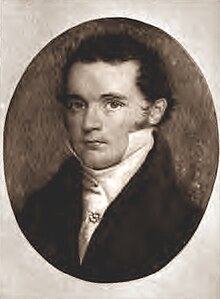John Lowell, Jr. (philanthropist)
| John Lowell Jr. | |
|---|---|

John Lowell Jr.
|
|
| Born | May 11, 1799 |
| Died | March 4, 1836 (aged 36) |
| Nationality | United States |
| Occupation | Businessman and founder of Lowell Institute |
| Parent(s) | Francis Cabot Lowell and Hannah Jackson Lowell |
John Lowell Jr. (May 11, 1799 – March 4, 1836) was a U.S. businessman, early philanthropist, and through his will, founder of the Lowell Institute.
Lowell was the son of pioneer industrialist Francis Cabot Lowell (1775–1817), one of the founders of the region's textile industry, and Hannah Jackson, sister of Patrick Tracy Jackson, another industrial pioneer. His grandfather and namesake, Judge John Lowell (1743–1802), referred to as The Old Judge, served in the Congress of the Confederation in 1782 and was appointed later to federal benches by Presidents George Washington and John Adams.
After receiving his early education in the Boston public schools, young Lowell was taken by his father to Europe and placed at the high school of Edinburgh. In 1813, at the age of 14, he returned to America and entered Harvard College. Plagued with ill health, he left college after two years and entered his family’s mercantile firm, sailing before the mast to India, the East Indies, and England.
Returning from his voyages with invigorated health, Lowell devoted himself to business and, in his leisure time, to book collecting, reading, and politics, serving on the Boston Common Council and in the Massachusetts State Senate. The 1820s and 1830s were a turbulent period in New England, marked by intense political and religious conflict between an insurgent popular democracy, which challenged economic and religious establishments, and an emergent capitalist elite which, though almost invariably defeated at the polls, was learning to use its wealth to advance its political agenda through non-political means.
Conflict between the Unitarian elite and the evangelical urban masses intensified in the 1820s, as followers of popular ministers like Lyman Beecher openly challenged elite-controlled institutions like Harvard and the Boston Athenaeum using a variety of voluntary associations – young men’s and mechanics societies, lyceums, debating clubs, and temperance groups. The continuing erosion of the elite’s cultural authority was deeply troubling to Lowell and his contemporaries.
...
Wikipedia
